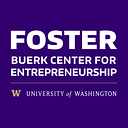Present & Future Collide at 2024 Hollomon Health Innovation Challenge
Judges awarded BioLegacy the $15,000 WRF Capital Grand Prize at the 9th annual competition hosted by the Buerk Center for Entrepreneurship.
Written by: Charles Trillingham, Buerk Center for Entrepreneurship
Sometimes the best innovations can seem more like science fiction than reality. Books and movies have talked of un-freezing heroes for decades. The students on team BioLegacy want to do the same. Only in this case, the heroes are the doctors and their patients waiting for desperately needed organs for transplant. Judges awarded BioLegacy the $15,000 WRF Capital Grand Prize at the 9th annual Hollomon Health Innovation Challenge (HIC) for its organ cryo-preservation and rewarming innovation. The multi-disciplinary team of Seattle University students (mechanical engineering, chemistry, and finance) and University of Washington students (mechanical engineering) are working to make the lifespan of transplant organs go from 24 hours of viability to potentially years.
Many of the 22 teams who showcased at this year’s Final Round, hosted by the UW Foster School’s Buerk Center for Entrepreneurship, have ideas planted firmly between present impact and future possibility.
The $10,000 Herbert B. Jones Foundation Second Place Prize was awarded to team Revyn Medical Technologies out of the University of Victoria in British Columbia. The team of biomedical engineering, engineering and computer science students are developing an improved speculum for gynecological care. They seek to upend a traditional device “that was developed in the 19th century” and is still used today.
Judges selected Piezo-Pulse from the University of Washington for the $5,000 Acclara Third Place Prize. The team of applied bioengineering master’s students is developing an implantable “energy harvester” to dramatically extend the battery life for leadless pacemakers. Piezo-Pulse also received the $2,500 Fenwick & West Best Idea for a Medical Device Prize, which recognizes a medical device concept (for a physical product) with the most promising opportunity to significantly improve the lives of patients or providers.
The 2024 HIC featured a record-breaking 53 applications from student teams across the Pacific Northwest and British Columbia. The finalists represented five different colleges and universities alone. A total of $41,000 in prizes went to student teams who pitched and created booths displaying their ideas to 100 judges representing the health, biotech, investor, and entrepreneurial communities across the Pacific Northwest.
Team CarePath from the University of Washington received the $2,500 Kent & Lisa Sacia Best Idea in Digital Health Prize for its wayfinding product that aims to make hospital campuses safer and smarter. The team of Foster Executive MBA students is developing a scalable software solution that allows clinicians and patients to have easy access to turn-by-turn directions during a wide-range of care situations. The Digital Health Prize recognizes an innovative digital health application that has a high likelihood of being implemented in practical healthcare situations and is expected to have a meaningful impact.
The $2,500 Jim & Timmie Hollomon Best Idea for Patient Safety Prize was awarded to ShockSafe from the University of Washington. The team of mechanical engineering and chemical engineering students developed an AED weight-detection accessory to distinguish between pediatric and adult patients during cardiac arrest emergencies. The prize recognizes a technology-enabled solution that aims to improve patient safety through the reduction of medication-related errors, medical complications with patient care, procedure/surgery-related errors, infections, and/or diagnostic errors.
Team ReviveHer won the $2,500 Population Health Initiative Best Idea for Addressing Health Access and Disparities Prize. The group of biochemistry students from the University of Washington is developing a cutting-edge, universal attachment for training mannequins that addresses the gender disparities in CPR outcomes. The prize recognizes a student innovation or intervention that seeks to close the gap in health disparities for low-income and disadvantaged groups by increasing access to point-of-care healthcare services and/or addressing systemic biases within the current healthcare system.
Judges also selected team ACT-NIRS from the University of Washington to receive a $1,000 Connie Bourassa-Shaw Spark Award, which recognizes teams that, in the eyes of the judges, just missed out on one of the top three awards. The team of applied bioengineering master’s students is developing a probe that detects brain tissue oxygenation and helps prevent severe neurological issues in critically ill pre-term infants.
Health Innovation Challenge Journey Continues
While seven different teams did take home awards at the event, no one left empty-handed. All teams who participated in the HIC (including those in the Screening Round) received detailed feedback from judges on how to move their innovations forward. Many will continue on by competing in the upcoming Alaska Airlines Environmental Innovation Challenge (March 28) and the multi-stage Dempsey Startup Competition (April/May) student competitions, or by applying again for the HIC next year. A few of the teams representing the University of Washington are also being supported by our partners at UW CoMotion.
You can find this press release and other stories from the Buerk Center right now on the Foster blog by clicking the link at the bottom of our webpage.
Originally published at https://blog.foster.uw.edu on March 1, 2024.
